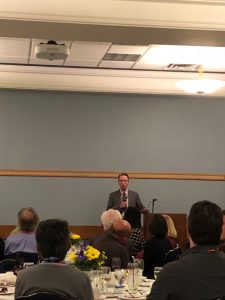Last week I visited Ann Arbor, Michigan for the 2017 Biennial Meeting for ICPSR’s Official Representatives (ORs). The meeting theme, “Building for a Data-Driven Future,” was a chance for ICPSR’s consortial members to learn more about the collections and get to know the ICSPR staff, educational programming, and data archiving efforts. Here’s five things I learned at the conference.
1) ICPSR offers a robust range of resources and guidance for teaching with data. I had already known about the Data-Driven Learning Guides that ICPSR produces, but I got the chance to see that these really are effective, packaged datasets that can be used to teach concepts or statistical methods in a variety of contexts. I hope that anyone teaching with data at NYU makes use of these guides, even if for a point of departure.
2) When teaching data literacy we should focus the discussion on the methods inherent in the data rather than cycling through lists of places where people can find data. This was the focus of Lynette Hoelter’s excellent workshop on the methods, vocabulary, and practices of information confidentiality within social sciences research (slides are available here). The mode of collection matters, as does understanding the inherent biases and limitations of standard data studies. ICPSR metadata allows for users to locate studies according to methodology, coverage, universe, etc. I’m beginning to realize that students need to begin with these considerations before fully forming a research question that involves data.
3) It’s difficult for libraries to provide services and support on campus for patrons who have the need to access secure data. Many of my colleagues are in the same boat I am; we do not have the space or physical infrastructure to facilitate access to data with confidentiality requirements. A big part of our responsibility is to partner with other institutions who may have this capacity and glean ideas; however, we should also work toward helping researchers find alternative datasets or surrogates (public use files) that still may allow them to ask meaningful questions (when possible). ICPSR itself is leading an effort in this area to develop protocol for a virtual data enclave and a process for researcher credentialing, which would facilitate access to data for those who otherwise could not have the institutional support to work with it.
4) It rains a lot in Ann Arbor.
5) Legendary data librarian Bobray Bordelon’s staple karaoke song is allegedly Lady Gaga’s “Bad Romance.” We didn’t get to see a performance in person, but we did get to celebrate his acceptance of the William H. Flanigan award for distinguished service as an ICPSR Official Representative. I, with many other members of the ICPSR and data librarianship community, am in awe of Bobray’s knowledge and generosity to the field. We also learned that Princeton University LibGuides and webpages are the number 2 source of traffic to all of the data housed by IPUMS, which is surely a testament to Bobray’s work. Congratulations, Bobray, on this prestigious award.

